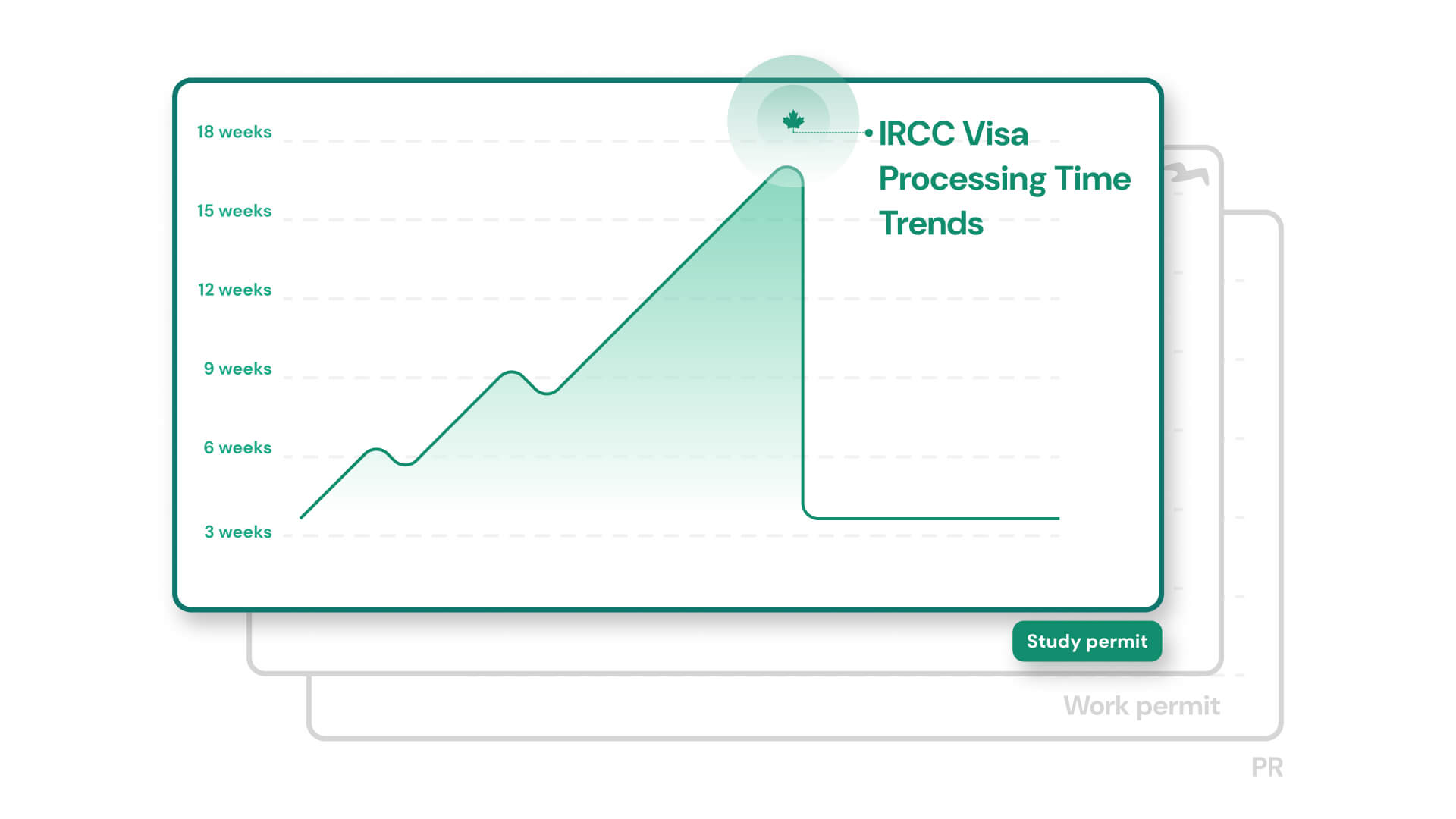IRCC processing time trends: Canada visa processing time tracker
IRCC processing time tracker
This tool provides historical processing times for various immigration, refugee, and citizenship applications handled by Immigration, Refugees and Citizenship Canada (IRCC). It is designed to help applicants understand how long their application might take from the moment IRCC receives it until a decision is made.
Who should use this tool?
Anyone who has submitted or plans to submit an application to IRCC—whether for a visa, work permit, study permit, permanent residence, or citizenship—can use this tool to get an idea of the expected processing times.
How accurate is it?
The processing times displayed are based on historical IRCC data and are updated regularly. This does not include GCMS notes processing time, which is sourced from our partners. While the tool provides data as published by IRCC, and is relevant for most applications, the actual processing times may vary depending on various factors such as application volume, country of residence, and individual circumstances.
How far back does the data go?
The data in this tool goes back several years, offering insights into how processing times have evolved. The information is continuously updated to reflect the most current processing times available, ensuring that users have access to the latest estimates.
Understanding IRCC processing times
IRCC processing times represent an estimated duration it takes to process a Canada visa application. It's essential to note that these are estimates provided by IRCC and most applications are processed within these timeframes, however, actual processing times can vary depending on several factors.

Processing times for common application types
While our data is updated multiple times daily, please note that processing times may change at any moment. There could be a slight delay in reflecting the most recent data.
1. Temporary Resident Visas (TRV)
Temporary Resident Visas include visitor visas, work permits, study permits, eTA etc. The processing times for these applications differ based on the country of residence and type of application.
2. Permanent residence processing time
The processing time for permanent residence (PR) applications varies significantly. The time it takes from AoR to PPR depends on the category of immigration program under which the application is submitted.
3. Citizenship Applications
Becoming a Canadian citizen is the final step for many immigrants, and the processing time for citizenship applications varies based on factors such as location and application completeness.
4. GCMS notes processing time
GCMS (Global Case Management System) notes are internal records maintained by IRCC that provide detailed information about an individual's immigration or visa application. These notes can include the case officer's observations, reasons for decisions, and any updates regarding the application status. Processing time for GCMS notes typically ranges from 30 to 40 days, as they are considered an Access to Information (ATIP) request. This timeframe is distinct from the actual visa processing time and is solely related to retrieving and sharing internal case details with the applicant.
Unlike GCMS notes, which provide insight into the progress and reasoning behind an application, visa processing focuses on evaluating eligibility, security, and admissibility criteria before granting or refusing the application.
Factors affecting processing times
While IRCC strives to maintain consistent processing times, several factors can influence the Canada visa processing times:
- Type of Application: Different visa categories (study permits, work permits, permanent residence, etc.) have varying processing times.
- Country of Residence: Processing times for temporary residence applications can vary significantly based on the applicant's country of residence.
- Completeness of Application: Incomplete applications or missing documents will result in delays, as IRCC must request additional information.
- Volume of Applications: High application volumes, especially during peak seasons, can lead to delays in processing times.
- Information Verification: The ease with which IRCC can verify the information provided in your application affects processing speed.
- Background Checks: Some applications may require additional background or security checks, which can prolong the processing time. These checks are also generally the reason behind IRCC ghost updates. Learn more about ghost updates.
- Interview or Further Verification: If IRCC requires an interview or additional verification steps, this may increase the processing time for the application.
- Applicant Response Time: Delays can occur if you take a long time to respond to IRCC requests for additional information or documents.
- Other Factors: Circumstances beyond IRCC's control, such as global events or system outages, can also affect processing times.
- Submission Method: Online applications are often processed faster than paper applications.
To know the estimated processing times for any specific application type and country of residence, check our IRCC processing time tracker. It is essential to submit complete and accurate applications to avoid unnecessary processing delays and to stay informed through IRCC's online processing time tools.